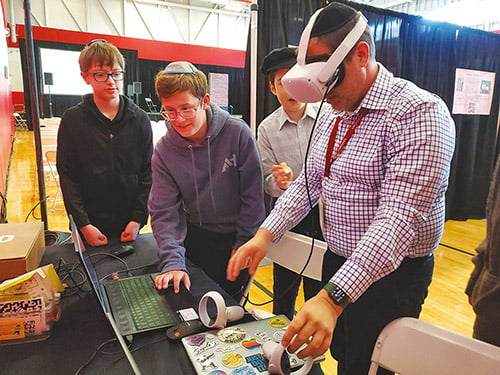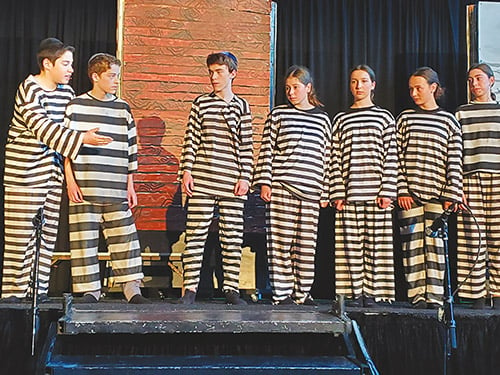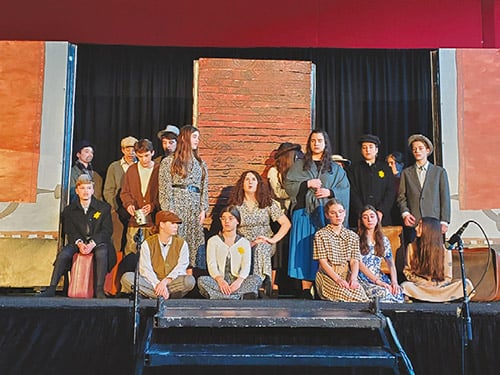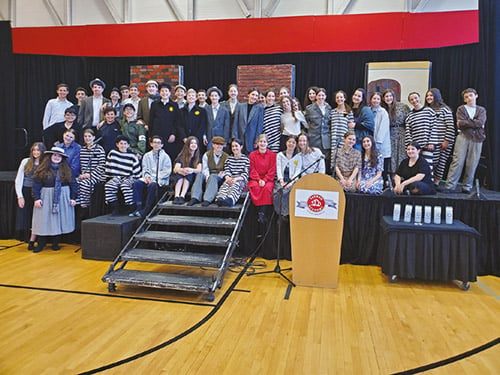
Last Wednesday evening, Yavneh Academy held an extraordinary evening of Holocaust remembrance, commemoration and connection as the eighth-grade graduating class showcased their months of hard work and creativity in a presentation the audience will never forget.

Yavneh eighth graders took on a tremendous task in the planning and execution of this evening. The capstone project is always a highlight at the school, drawing on the talents of every student in the grade, whether on or behind the stage, and culminating in an inspiring evening for everyone involved.
This year, however, the students went above and beyond, curating a multi-media gallery with four coordinating sections: a virtual reality experience, Yavneh Connects, a mini-museum and a live theater performance.
Barbara Rubin, Yavneh middle school principal, told The Jewish Link, “The students were gifted to work with Steve Fox and Bruce Prince of the Northern New Jersey Holocaust Memorial and Education Center. They worked with us to create the virtual reality museum, in coordination with Warren Black, who created the software for the program.” Chani Lichtiger, director of education technology and curriculum design at Yavneh, spearheaded the project, which included five exhibits: Before the War, The Ghetto, Liberation, The Life of Elie Wiesel and March of the Living. This unique medium had each guest wearing an oculus as they were immersed in the world of virtual reality, which brought the past alive.

Fox explained the process: “We contracted with VR Quest, and Warren Black, to give the Yavneh students and teachers licenses and training so they could create the virtual reality experience they wanted.”
Black has been exploring virtual reality in the classroom for close to 29 years and feels strongly that it is a valuable educational medium. VR Quest is unique because students don’t just “see the information on a headset, but they create the experience themselves and will retain the information that much more,” explained Black. The program, which is used for social studies and STEM, can be accessed on a home computer and doesn’t need the headset to function. Black is the sole provider of virtual reality software for the New York City Department of Education and is now expanding into New Jersey schools.
Fox emphasized that while plans for a physical memorial are in the works, the Northern New Jersey Holocaust Memorial and Education Center “is trying to raise awareness through educational programming and looking to work with other schools to give students the chance to learn about the Holocaust through this medium.” The VR Quest technology will soon be available in the Teaneck library for widespread use.
The next portion of the evening, Yavneh Connects, was introduced a few years ago by Claire Hirschorn, whose specialty is tech integration at Yavneh. This program created a fascinating living memorial by pairing Yavneh students with survivors and their descendants. “The children created poster boards with pictures of themselves with their survivor and information about their life. A QR code took the viewer to an oral interview with the survivor, including pictures of their original family, where they came from and photos of the students with their families,” explained Rubin.
The haunting mini-museum gallery displayed representations of ghetto walls, barbed wire, a Torah saved from Kristallnacht, a Kindertransport train and notably “The Arm of Auschwitz,” a plaster-of-Paris arm etched with the number of Toba Mauskop, Yavneh art teacher Malky Kazam’s grandmother.

That personal thread ran through the entire evening, as all of the survivors highlighted through Yavneh Connects were grandparents, great-grandparents or relatives of Yavneh students. Nothing could bring home the message of the importance of educating the next generation and keeping the chain of Judaism alive as much as hearing these stories directly from their ancestors and relatives, cementing this incredibly close link between the students and the past.
The last segment of the evening was the live theater performance of “Night” by Elie Wiesel. Rabbi Shmuel Burstein, longtime Yavneh teacher and producer of the play, explained that this was the first time in his 21 years at Yavneh that Wiesel’s story was being told. The play came alive under new director Mikaela Simon, taking over for Dominique Cieri, who retired after two decades of leading the program with passion and talent. Simon’s skill and spirit, combined with Rabbi Burstein’s leadership, inspired the writers and performers to embody the lives of Elie Wiesel, his family and those imprisoned with him in the concentration camp.
A hallmark of this program for Yavneh students is that everyone gets involved in the evening in some way, stressed Rabbi Burstein. “A group of selected students were taught how to write a play by our director and playwright. They wrote in January and auditions were held soon thereafter. Thirty-five students performed in the play.” The multimedia segment of the evening “bridged with the play and ensured each student was able to participate in Holocaust memory,” continued Rabbi Burstein.

Excited to be performing in person again after a two-year hiatus, the school went all in, embarking on “a professional stage construction in the middle school gym, with Joe Savetzky, a Yavneh parent and consummate professional event builder, who turned our gym into a veritable theater. Guests commented on how we managed to pull off such a professional theatrical production,” added Rabbi Burstein.
Rubin, a child of survivors, has always been passionate about Holocaust education. “I am so proud of the children. They never cease to amaze me with their continued growth and the compassion, love and hard work that went into this overall presentation.”
By Michal Rosenberg









